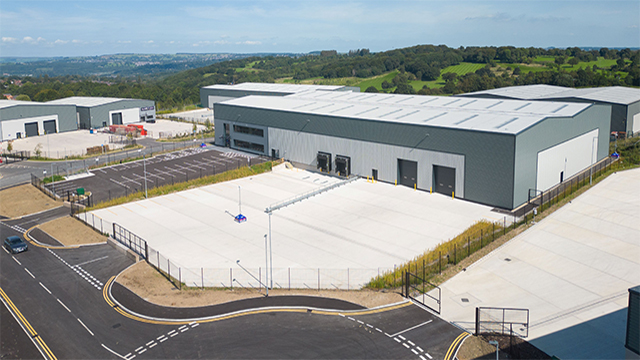EG’s first Tech Awards brought the property and tech sectors together to celebrate under one roof. Bridging the Gap Award winner Dan Hughes reveals how he is knitting the industries together on a day-to-day basis.
The inaugural EG Tech Awards were all about celebrating cohesion and collaboration. With an overarching focus on bringing the property and tech worlds together, this was not an event aimed solely at the real estate sector. Nor was it aimed solely at the technology companies and individuals looking to disrupt and enable it. It was a celebration of how these two sides of the equation can work better together and, in the context of the wider, ever-changing world, to prepare for an uncertain future.
There was one award in particular that neatly encompassed this whole concept. Former RICS director of data Dan Hughes picked up the Bridging the Gap Award after the great strides he has made in knitting together the complex and often incongruous worlds of property and technology. Now, having branched out on his own with his consultancy Alpha Property Insight, Hughes has more ambitious plans to facilitate widespread digital transformation.
EG: This award was all about bringing together the property and the technology worlds. How have you done that more widely so far and how easy is it to build that relationship?
DH: Well, I’ve tried to do that. There is still a long way to go. The property sector does so much great stuff, but one of the things it doesn’t do particularly well is innovate; it doesn’t change that much.
What is happening now in the wider world is forcing it to change. But proptech is not the point of that change, rather it is an enabler and one of many drivers behind the much-needed transformation. Technology is helping to improve real estate, though. And that’s the message I am trying to communicate.
One thing I have noticed is that technology is starting to be taken more seriously. The real estate world is no longer just using it as a tool, but is actually accepting that it will change the way people do their jobs and use buildings. In terms of how easy the relationship is to build between the two, the biggest thing that any company needs is to be open to change.
Property is such a big sector and there are so many different types of people and roles and buildings and we all do different things that it’s really important to be open to the fact that everything is changing.
EG: What advice would you give to the tech side of the equation wanting to work with property companies, given the complexities of working with an industry that is slow to adapt yet simultaneously on the cusp of a major transformation?
DH: To really understand the problems the property sector is facing and the problems it needs help solving; that would be my main piece of advice. The real estate industry is about building houses for people to live in and offices for people to work in and, actually, focusing too much on the technology is the wrong place to start. The most important thing for everyone is to work out what are we trying to achieve, whether that’s about making more money or creating better places for people to live and work.
Technology has a role to play in all of these scenarios, but it can only really work if there is an understanding of why it is needed. If you look at the tech companies that are doing well, they’ve identified a market need. They understand the problems within the property sector and have worked out how their technology can be applied to help fix them.
EG: Is there enough understanding in the tech sector currently that this is the best way to engage with the real estate world?
DH: It’s a mixture. There are some people who are focused very much on the technology itself. But that technology is really going to struggle be the answer on its own without a proper understanding of the context that it works within. But then there are the technology companies that have been created by or have employed people in real estate. It’s not impossible if you are coming at things from a pure technology point of view, but it’s a lot harder to get traction and make a difference.
EG: Are there still plenty of property companies out there looking at the way the sector is changing who simply think
‘I have no clue what to do next’?
DH: Yes, and there are companies out there who are not just making a change, but are being brave enough to put their hands up and say ‘you know what? We don’t really know what to do or how to start’.
Transformation is not about doing what we have always done, but doing it a bit better or more quickly by using technology. It requires instigating a much bigger change and doing things totally differently. There are people in the industry who have been in it for a long time currently being looked up to for all the answers and that can be difficult. It is so brave to say ‘I don’t really understand what technology does or how it works’.
EG: Is that lack of understanding still common? And does it actually matter?
DH: It is very common. As for whether it matters, it depends on the context but, when it comes to understanding the inner workings of a piece of tech, there is no reason people in property should understand that. There are plenty of people out there who can explain it perfectly, can tell them what that piece of tech is going to do and the impact it’s going to have on their business.
One of the things that I often say is that it’s a little bit like the microchip, which has changed the way that we do pretty much everything in our lives, but not many people need to know about chip itself, how it’s built or how it’s designed. All they need to know is that it can make things a lot quicker and easier.
EG: What is one of the biggest threats to the property world currently if it doesn’t recognise the importance of adapting?
DH: There are still an awful lot of people who are focused on doing things the way that we’ve always done. That leaves us ripe for disruption.
There is going to be more change in the sector from other companies than people realise. By that I mean either startups, which can grow very quickly and do something very different, or big companies, which might start looking at the property sector in a way that they haven’t traditionally.
EG: Are there elements of digital transformation that are just out of the industry’s hands? Like trying anything new, how much does any success ultimately come down to luck?
DH: Like so many things, it is a combination. We work in an environment in real estate where we don’t move that fast and property doesn’t change that much. You could say that’s a bad thing and has seen the sector get left behind. But actually, in many ways, that’s the advantage of property now and one of the things that makes it so attractive to tech companies – there is so much value because there is a long way to go.
You could argue that’s luck and timing. But, beyond that, it is less about chance and more about making a choice. A choice to being open to change. What you do today is going to have to be different in two years, which will have to be different in five years. And that’s not a situation that the property sector has faced before in terms of general data and digital adoption.
EG: If there is one thing that will affect everybody the most over the next six to 12 months, what would it be?
DH: Data comes up in conversations all the time. It is central to almost everything that we do in the property sector in some shape or form. There are some really good examples of where data is moving higher up the agenda. Just as one example, it is now really important for businesses to understand how data is used in their office.
And that’s going to become more and more important. But it isn’t prescriptive. There isn’t necessarily a right or wrong answer as there are companies who do exactly the same thing today but might have very different businesses in the future as they decide to deal with data differently.
The other point I would make is that, while there is a key relationship to be maintained and fostered between property and technology, the property sector is ultimately going to be driven by the property sector. The companies who really embrace change are the ones that are going to succeed.
Main image: © Telling Photography
Listen to an interview with Dan Hughes and all of EG’s tech podcasts at www.techtalkradio.podbean.com
The EG Tech Awards will be back in 2019. For inspiration and full details of this year’s event go to www.egi.co.uk/tech-awards-2018/











